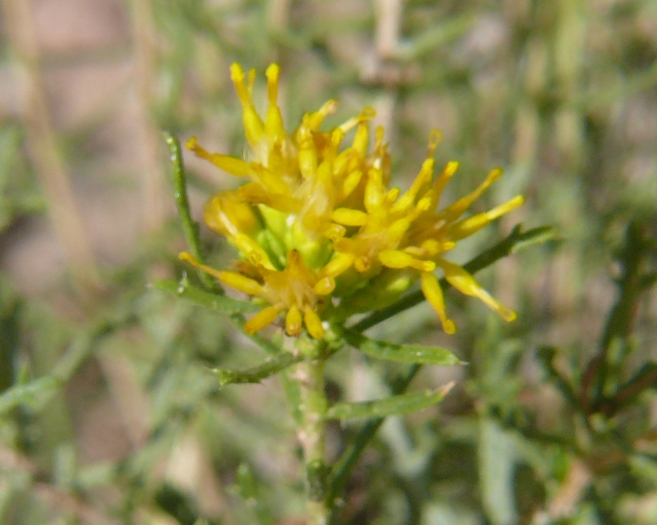Burroweed
(Isocoma tenuisecta)
Burroweed (Isocoma tenuisecta)
/
/

Sue in az
Public domain
Image By:
Sue in az
Recorded By:
Copyright:
Public domain
Copyright Notice:
Photo by: Sue in az | License Type: Public domain | License URL: https://creativecommons.org/public-domain/ | Uploader: Sue in az~commonswiki | Publisher: Wikimedia Commons | Title: Isocoma_tenuisecta.jpg | Notes: {{Information |Description={{en|1=Photographed San Francisco Botanical Garden Arboretum}} |Source={{own}} |Author=[[User:Eric in SF|Eric in SF]] |Date=1 October 2005 |Permission= |other_versions= }} [[Category:Proteaceae]] [[Category:I |



















































Estimated Native Range
Summary
Isocoma tenuisecta, commonly known as Burroweed, is an evergreen subshrub or herb native to arid and semi-arid regions, including grasslands, deserts, and scrublands in the Southwestern United States. It is a North American species of small, flowering perennial herbs. Typically, Burroweed reaches 1 to 3 feet (30–90 cm) in height. Its leaves are narrowly lance-shaped, with numerous large teeth or small lobes along the edges, and are glandular and lobed, which can give them a sticky texture. The plant is notable for its yellow clusters of flower heads that appear from September through November. Each head contains 8-15 yellow disc flowers but no ray flowers, creating a distinctive appearance as the old heads turn dry and tan, remaining on the plant after the achenes have dispersed.
Burroweed is valued for its drought tolerance and ability to thrive in challenging environments, making it suitable for xeriscaping and naturalistic plantings in arid regions. It is often used for erosion control and habitat restoration projects. In cultivation, Burroweed requires full sun and well-drained soils. While it is not particularly demanding in terms of water, it does benefit from occasional deep watering during prolonged dry periods. Gardeners should be aware that Burroweed can be toxic to livestock if ingested in large quantities.CC BY-SA 4.0
Burroweed is valued for its drought tolerance and ability to thrive in challenging environments, making it suitable for xeriscaping and naturalistic plantings in arid regions. It is often used for erosion control and habitat restoration projects. In cultivation, Burroweed requires full sun and well-drained soils. While it is not particularly demanding in terms of water, it does benefit from occasional deep watering during prolonged dry periods. Gardeners should be aware that Burroweed can be toxic to livestock if ingested in large quantities.CC BY-SA 4.0
Plant Description
- Plant Type: Subshrub, Herb
- Height: 3-4 feet
- Width: 0.5-5 feet
- Growth Rate: Moderate
- Flower Color: Yellow
- Flowering Season: Fall
- Leaf Retention: Evergreen
Growth Requirements
- Sun: Full Sun
- Water: Low
- Drainage: Medium
Common Uses
Drought Tolerant, Erosion Control, Low Maintenance
Natural Habitat
Arid and semi-arid regions, including grasslands, deserts, and scrublands in the Southwestern United States
Other Names
Common Names: Shrine Jimmyweed, Burrow Goldenweed
Scientific Names: , Isocoma tenuisecta, Haplopappus tenuisectus, Haplopappus fruticosus, Isocoma fruticosa,
GBIF Accepted Name: Isocoma tenuisecta Greene